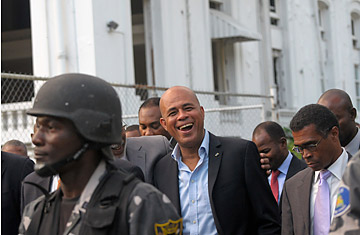
Haiti's President Michel Martelly, center, leaves a news conference at the National Palace in Port-au-Prince March 8, 2012.
When Haitian President Michel Martelly visited the Dominican Republic last month, he was awarded the country's highest honor for a foreign head of state, in large part for his efforts to lure reconstruction investment to Haiti after its catastrophic 2010 earthquake, which killed more than 200,000 people. In an interview in Santo Domingo, the Dominican capital, Martelly told TIME he's "tried to change the perception [the world] has of Haiti as a place where nothing works," and he listed his accomplishments so far, including $450 million in tourism investment. "Haiti is a land of opportunity," the boisterous former carnival singer said. "Because Haiti is still a virgin."
But a few days later, accusations of less than virgin behavior were swirling around both Martelly and one of the Dominican Republic's most prominent politicos. In a March 31 national television broadcast, Dominican investigative reporter Nuria Piera alleged that Dominican Senator Félix Bautista — who owns or controls construction companies that in the past year have received Haitian government contracts worth more than $200 million — paid Martelly a total of almost $2.6 million during Martelly's presidential campaign and after his landslide victory in Haiti's 2011 election. The charge, based on spreadsheets of bank records Piera displayed on the air, was serious enough to prompt Dominican federal prosecutors to declare Bautista under investigation. Both the Senator and Martelly, whose office calls the allegation "a media lynching," deny it.
The Bautista controversy, fairly or not, is a jolting reminder of Martelly's mixed record — and the governmental dysfunction still plaguing Haiti during its recovery — as he approaches his first year in office next month. The construction contracts in question, including one to rebuild Haiti's legislative palace, were awarded in 2010. But late last year they became the targets of an audit by Martelly's then Prime Minister, Garry Conille — who in February resigned largely because of pressure from members of Haiti's parliament and Martelly's government, who resented the scrutiny. The exit of Conille, a trusted technocrat whose appointment was backed by the U.S. and the international community, set back Haiti's recovery efforts and highlighted the acrimonious relationship between Martelly and Parliament.
Piera's corruption investigation suggests that Bautista, a leader of the ruling party of Dominican President Leonel Fernández, made the payments to Martelly, who was a heavy favorite to win Haiti's March 2011 presidential vote, in order to keep winning contracts under the new Haitian government. In a joint declaration on Thursday, April 12, both Fernández's and Martelly's administrations called the journalist's charges part of a vague "plot" by opponents to discredit Martelly and aid the Dominican opposition in that nation's May presidential election.
Either way, the controversy has forced Martelly off message yet again. When he met with TIME last month, he seemed to have put the Conille resignation flap behind him — his new Prime Minister choice, longtime friend and business associate Laurent Lamothe, has been approved by the Senate — and talked confidently of new investment ventures that he hoped were a signal that "Haiti is open for business." He emphasized the positive reception he'd gotten at the World Economic Forum gathering in Davos, Switzerland, in January, when Irish billionaire Denis O'Brien, head of cellphone powerhouse Digicel, as well as the chairmen of Marriott, Heineken and Nestle, all spoke "about what an opportunity Haiti is," he said.
Digicel and Marriott, in fact, have since joined forces to build a $45 million, 173-room hotel in Port-au-Prince, and last month an arm of the World Bank Group pledged a $10 million fund to spur small- and medium-size businesses. The "Invest in Haiti" forum that Martelly hosted last November drew a thousand capitalists from industries like tourism, infrastructure, agriculture and textiles and resulted in $200 million in contracts. The Haitian government itself is poised to spend up to $700 million, meaning the western hemisphere's poorest nation could see at least $1.25 billion invested inside its borders in the coming months. "Once we invest that," Martelly told TIME, "you attract other investors and companies and they feel like things are moving. You'll have more of that coming."
